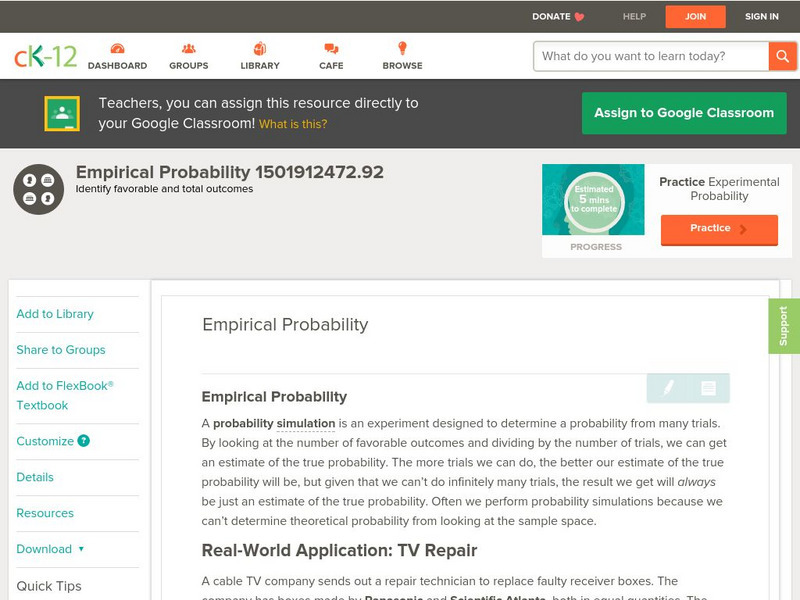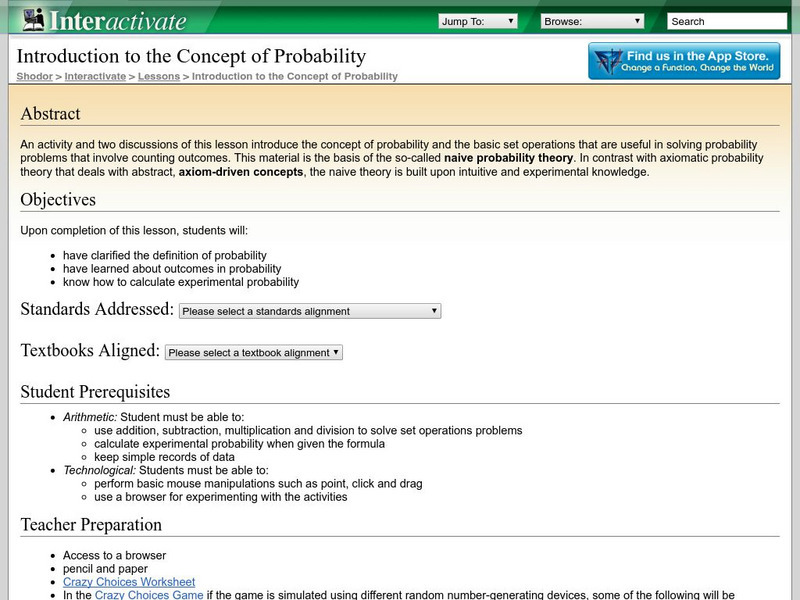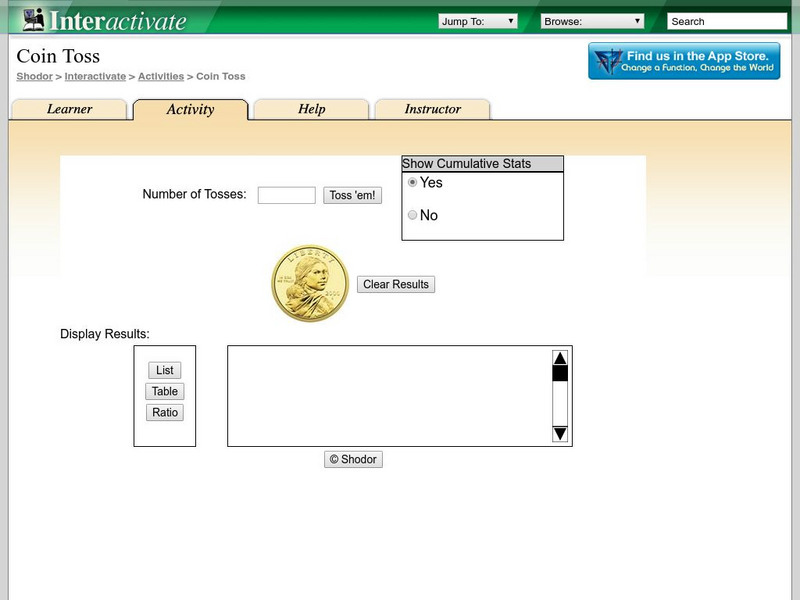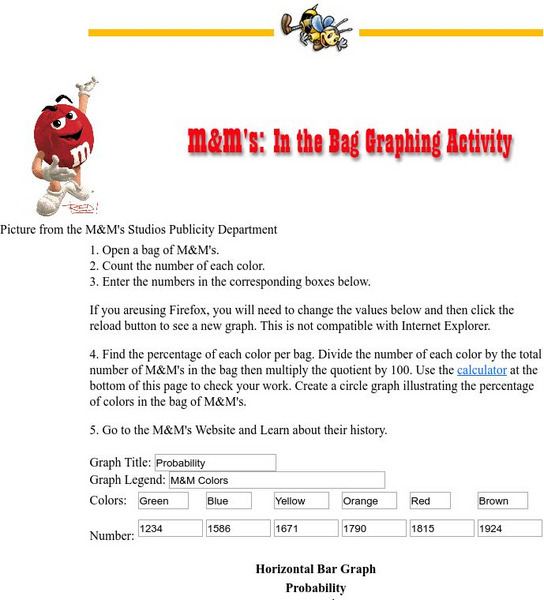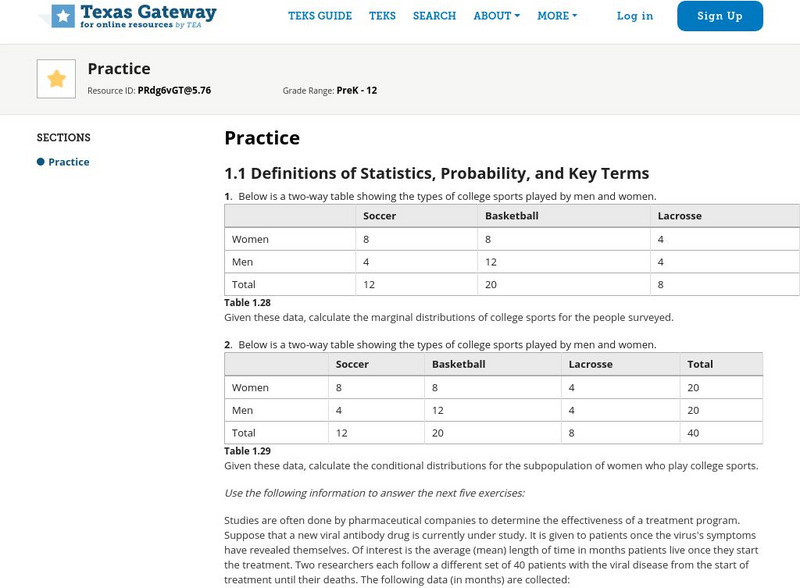Hi, what do you want to do?
Better Lesson
Better Lesson: Theoretical vs Experimental Probability
Sixth graders will be able to see the relationship between theoretical probability and experimental probability by computing both at the same time.
Texas Education Agency
Texas Gateway:using Theoretical and Experimental Probability to Make Predictions
Given an event to simulate, the student will use theoretical probabilities and experimental results to make predictions and decisions.
CK-12 Foundation
Ck 12: Probability: Empirical Probability
[Free Registration/Login may be required to access all resource tools.] Simulate real-life situations with an experiment and find the experimental probability of a specific event.
Shodor Education Foundation
Shodor Interactivate: Lesson: Intro to the Concept of Probability
The Shodor Education Foundation provides this lesson plan to introduce students to the concepts of probability. Students learn about the definition of, outcomes in, and calculations of experimental probability. Students use an...
Alabama Learning Exchange
Alex: Probability What Are the Odds?
This instructional activity introduces middle schoolers to experimental and theoretical probability using spinners and trials with pennies. Students also research careers that involve probability, and create a video presentation. It...
Shodor Education Foundation
Shodor Interactivate: From Probability to Combinatorics and Number Theory
Apply division to determine the probability of outcomes with a racing game.
Oswego City School District
Regents Exam Prep Center: Theoretical Versus Empirical Probability
Use this site to learn the difference between theoretical and empirical probability. A practice page is included for each and two teacher resource pages contain classroom activities.
Alabama Learning Exchange
Alex: Probability What Are the Odds?
This lesson introduces the student to the concept of probability. Students will explore the meaning of theoretical and experimental probability by viewing interactive websites. A lab activity will be performed using cooperative learning...
Alabama Learning Exchange
Alex: Probability
The purpose of this lesson is to begin the process of helping students to learn the basic principles of probability. The students will also collect data, interpret data, and determine the fairness of the game rock, paper, scissors.This...
Shodor Education Foundation
Shodor Interactivate: Crazy Choices Game
Compare theoretical and experimental probabilities, using dice, cards, spinners, or coin tosses. Three different probabilities can be compared at once.
Shodor Education Foundation
Shodor Interactivate: Coin Toss
A simple coin-toss simulation through which learners explore experimental probability. Accompanied by links to related activities, discussions, worksheets, and materials for instructors.
Other
The Actuarial Foundation: Are You Game? [Pdf]
Games are designed to help students understand and apply concepts of probability. determine fairness.
Cyberbee
Cyberbee: M&ms in the Bag Graphing Activity
Use a bag of M&Ms to learn about probability. Includes graphs and percentages, and the steps needed for the students to duplicate the numbers.
The Franklin Institute
A Penny Flipped Is Science Learned
What is the probability that a penny will land on heads when flipped? Test this on Ben Franklin's birthday and find out!
Alabama Learning Exchange
Alex: Can You Curl Your Tongue?
This lesson is adapted from a Connected Mathematics Unit, How Likely is It? This investigation introduces biology as a source of applications for probability. In this lesson, Curling your Tongue, students determine how many students in...
Shodor Education Foundation
Shodor Interactivate: Advanced Monty Hall
Choose one of N doors to experimentally determine the odds of winning the grand prize behind one of the doors, as in the TV program "Let's Make a Deal."
Texas Education Agency
Texas Gateway: Tea Statistics: Sampling and Data: Practice
A set of exercises where learners must analyze statistcal data and methodology and answer questions about distributions, sampling, results, accuracy, frequency, experimental design, and ethical practices.







